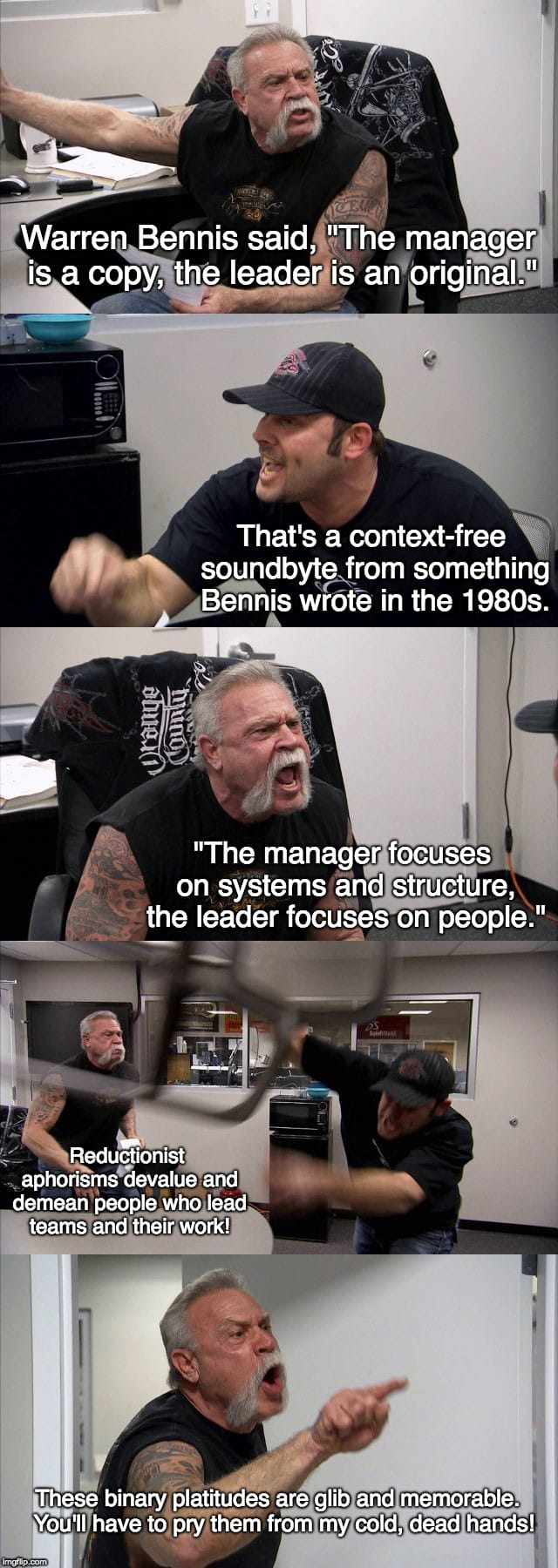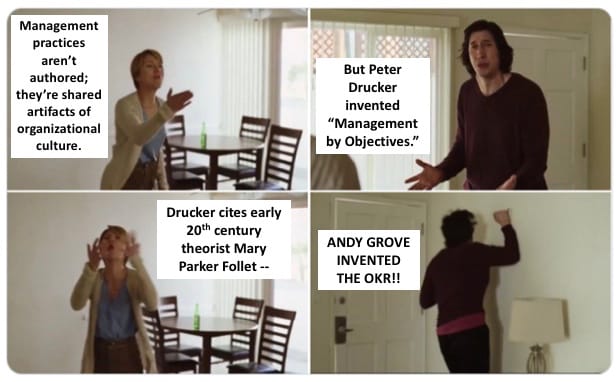Warm Take: abdication mode

Last weekend, I got a brief respite from some heavy family responsibilities. A night at movies seemed like the answer, but I wasn't up for any of the 7 horror flicks showing at every multiplex in my neck of the woods. Instead, I chose The Apprentice.
What was I thinking? Donald Trump’s origin story is also a horror film. No jump scares, but it really hammers home Trump’s bully playbook: attack; deny; never admit you’re wrong.
You don’t have to squint to see the various 21st century tech startups that have played the same game. Enter a market, even if you’re breaking the law. Use PR pros to denigrate detractors and work public sentiment; use lobbyists and lawyers to work legislators and the law to fit your product.
Theranos, Uber. (Drop me a note with your fave!)
Also, Airbnb. Not a fan! And yet, I’m about to opine that Airbnb’s CEO and co-founder Brian Chesky is probably a solid manager. I will mean it as a compliment.
À la mode?
So, way back in September, 2024, Silicon Valley influencer Paul Graham wrote about a talk Brian Chesky gave at a Y Combinator gathering. Per Graham, “As Airbnb grew, well-meaning people advised him (Chesky) that he had to run the company in a certain way for it to scale. Their advice could be optimistically summarized as ‘hire good people and give them room to do their jobs.'”
The results, Graham says, were “disastrous.”
Graham then opines that there are two ways to run a company. Founder Mode and Manager Mode.
Per Graham, we don’t really know what Founder Mode is. It’s currently a secret sauce. Now that it has been named, per Graham, it can be sought out and understood.
But regular readers can probably guess that Graham does not use the term Manager Mode as a compliment.
Graham says, “The way managers are taught to run companies seems to be like modular design in the sense that you treat subtrees of the org chart as black boxes. You tell your direct reports what to do, and it's up to them to figure out how. But you don't get involved in the details of what they do. That would be micromanaging them, which is bad.”
Um, ok. You can call this Manager Mode, if you’d like. I’ll call it Abdication Mode.
This bad advice is probably likelier bought by an inexperienced leader — exactly the profile of many YC recruits.
“Paul Graham, a prominent venture investor, once quipped that when evaluating entrepreneurs, the cut-off is 32. After that age, they start to become a little skeptical.”
Daniel Kim, interviewed in “Why Older Entrepreneurs Have the Edge”, Knowledge@Wharton, November 12, 2019
Chesky's original talk was off the record. After a zillion thinkpieces on Founder Mode, he elaborated on the topic at a travel conference (link below). Paraphrasing, Chesky basically says that no matter who you are, founder or successor, a CEO has to understand how their company works; they need to be "in the details."
Gosh, this seems like common sense. And certainly the management style I saw modeled in the early years of my business career.
In this century, in more than one early stage company, I've also heard, “just hire good people and let them do their jobs.” For some, it was almost a mantra. Nobody wants to be seen as a micromanager.
Being "in the details" does not mean micromanaging. Leaders, and particularly CEOs, have to understand the inputs, outputs, and expected outcomes of a business. The way into the details is through metrics, the right ones, that connect KPIs to the actual work being done.
I came up as a manager in the 1,000 person division of a bank. We had retail and wholesale products. Executives were kept informed about metrics, like how many retail inquiries we received, the average time we took to respond, what periods of the year were peak periods, the impact of new product launches on volume, and so forth. Leaders knew what questions to ask, and when to ask them. When something didn't track, even as a front line manager, I could expect some pretty senior people to ask me what was going on.
The division’s budget was built on these metrics. This is how you run a (real) company.
Y-Combinator famously takes groups of (inexperienced) people they deem as having potential, and provides them with resources and support to start companies.
Graham’s problem statement feels oddly passive: “The way managers are taught to run companies…” (italics mine.) It leaves me wondering what actually happens at YC, and who is teaching their participants to get ready to actually run these companies?
Maybe it's a branding problem?
In the late 20th century, one way to praise someone, professionally: describe them as a good manager. This wasn't just in my field. An appreciation for managers is on display in Andy Grove’s High Output Management (1983) and and other contemporaneous books and articles from the 80s and 90s.
At the same time, an idea began to gain traction: that leadership and management were qualitatively two different practices.
I’m not exactly sure how to identify the moment when Management’s brand went bad and wrong.
Anecdote: a consulting engagement during the dot-com boom, analysis of a management practices in a nascent corporate-venture-backed startup. The middle-aged corporate guy who led the venture told me: “Management doesn’t matter any more. The Internet has changed everything!” (NB: that venture did not survive.)
More structurally: before 1995 or so, Excel (or Lotus 1-2-3) was not on every professional’s desktop computer — if you even had a desktop computer. Consulting firms and investment banks deployed armies of smart 25-year-olds to build spreadsheet financial models of companies. My hypothesis is that the “management” lines on those spreadsheets were viewed as the proverbial low-hanging fruit, and another reason to denigrate the the work.
In the early '00s, Google realized that teams with good managers functioned better than other teams. At some point, they started posting stuff about this on the internet. At the time, I thought that some of it was very good.
But the waters had been muddied. In the early '10s, an influential tech investor scolded me online: managers were never good for a company (subtext: I was an idiot.) He quoted an 80s-era article at me, about the difference between leadership (noble) and management (picayune.) Lol.
Today, you have Paul Graham opining on Manager Mode.
Paul Graham has invested in how many companies: hundreds? Thousands? “Founder Mode” exposes his failure to understand a fundamental lever of business.
Management, for better and for worse, is happening. Not just in every company on Y Combinator’s spreadsheets, but in every single organization. In gas stations, hair salons, mom & pop restaurants; from the Grand Canyon to the canyons of Wall Street. And in our government bodies, which I fervently hope will soon deliver a free and fair election, and the peaceful transfer of power, here in the US.

Thanks for joining me this month. I'm hoping to get back to my ordinary Sunday-over-coffee schedule, but I'm still digging out after a lot of months of heavy caregiving.
That said, today's Wall Street Journal had an amazing article about the kind of best practices in management that I love to see, front and center. So glad I could include the gift link, below.
May you and your loved ones be safe, healthy, and free – and may those of you who are US Citizens find your path to the ballot box to be calm and without drama.
Links
- A Day in the Life of the 39-Year-Old Factory Boss Managing 3,000 Workers. (gift link), by John Keilman, Wall Street Journal, October 28, 2024. Fantastic, fantastic, article about plant manager Ryan DeLand. Brian Chesky said that you have to be "in the details," and partner with the people in your organization. This is what it looks like. This is what I spent my developmental years learning and practicing. This is what Andy Grove was teaching and practicing. And so on.
Call it Founder Mode if you wanna. Just know that it's not an innovation by Brian Chesky, Steve Jobs, or the author of any of the books I'm sure are forthcoming on the topic. - Work Wives Are Going Extinct, by Samhita Mukhopadhyay, Marie Claire, October 2024. The article, above, describes Ryan DeLand's "gemba" walks around the factory floor. We used to call this MBWA, or management by walking around. Samhita Mukhopadhyay's article about the effects of remote/hybrid on our relationships at work made me think about how managers can make up for the loss of this sort of vibe check. (h/t The Ann Friedman Weekly)
- Attack, Deny, Never Show Defeat: Trump Origin Story The Apprentice; a Tale of Ruthless Immorality and Wild Success, Lee Shoquist, Chicago Film, October 11 2024. Solid review of The Apprentice.
- Founder Mode, September 2024, Paul Graham.
- Airbnb CEO Brian Chesky at Skift Global Forum 2024 | Expanding Airbnb Beyond Accommodations, September 18 2024 NB: the first roughly 8 minutes are Chesky's response to the "Founder Mode" discourse, and worth watching. (I did not watch the whole thing (sorry not sorry.))
- Warm Take: On Layoffs. May 10, 2020. There was another time I complimented Brian Chesky as a manager, this time during Covid.
- Why Older Entrepreneurs Have the Edge, professor Daniel Kim, interviewed at Knowledge@Wharton, November 12, 2019. Research by Kim and his colleagues indicates that organizations started by older (i.e. More experienced) entrepreneurs have better outcomes. (I did not listen; I read the transcript.)
- Away with her, my 2019 piece about inexperienced managers taking heat for...not having the experience to be good managers.
- Between 2018 and 2019, I did a read along/close read of Andy Grove's High Output Management. I was curious about why people were reading this now 40-year old book, and whether it still applies to today's workplace. (Much of it does not.)
(pp. 1-50.) (pp. 51-100.) (pp.101-150) (pp. 150-200-ish) (pp. 200ish-conclusion) - Google re:Work is what remains of Google's online presence around the work they did around a range of workplace topics. I have not dipped in for a long while.
From their page on Management: "Management at Google hasn't always gotten the credit it deserves. In 2002, we ran an "experiment" to see how successful the organization could be without managers. The experiment failed. In 2008, another research team set out to prove that managers don't matter. Spoiler: they matter."





